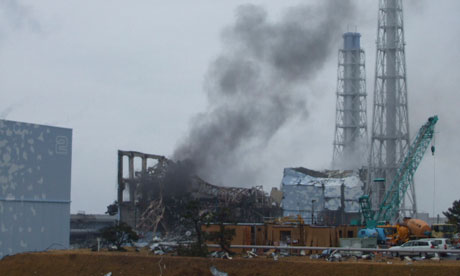
無断転載・複製を禁じます。
各地の放射線量
記事「福島・関東の放射線量は低下傾向 東北の一部は上昇」より 3/26
Japan nuclear plant workers in hospital after radiation exposure
Three cable-layers at Fukushima power plant exposed to high levels of radiation after stepping into contaminated water
- guardian.co.uk,
- Article history

Three workers at the Fukushima Daiichi nuclear power plant have been exposed to high levels of radiation after reportedly stepping into contaminated water as they battled to make the stricken No 3 reactor safe.
Two of the workers were taken to a special radiation unit at a hospital in Chiba city, east of Tokyo, Japan's nuclear safety agency said.
The workers, who are all in their 20s and 30s, were exposed to between 170 millisieverts (mSv) and 180 mSv of radiation.
This is above the usual legal limit of 100 mSv per year for nuclear power workers in Japan, but below a new limit of 250 mSv, introduced last week to enable them to spend more time inside the crippled facility.
The men were affected while laying cable in the turbine building of the No 3 reactor, said Fumio Matsuda, an agency spokesman, adding that two had exposed skin on their feet to radioactive elements.
Their accident cast doubt on the wisdom of raising the threshold for radiation exposure for the hundreds of technicians, firefighters and soldiers taking part in the Fukushima operation.
The government's chief spokesman, Yukio Edano, said the injuries were "very regrettable", but defended the health ministry's decision to raise the exposure limit soon after the start of the world's worst nuclear power emergency since Chernobyl.
"Atmospheric radiation levels are monitored constantly, but in this case the workers stepped into water," Edano said.
"The decision to increase permissible radiation exposure was taken on the advice of experts, who say that workers are able to withstand up to 250 mSv per year before radiation has an effect on their health.
"But this kind of exposure, from water, was unforeseen. We are trying to find out exactly what happened so we can ensure it doesn't happen again."
More than 20 workers have been injured at the Fukushima plant, 150 miles north of Tokyo, since it was badly damaged in the 11 March earthquake and tsunami. They include 11 who were hurt when the No 3 reactor building exploded.
The condition of the No 3 unit is of particular concern as it contains plutonium-uranium mixed oxide fuel and would release highly toxic plutonium in the event of a meltdown.
On Wednesday afternoon, workers were temporarily evacuated from the plant after black smoke was seen rising from the same reactor.
The smoke receded after an hour and radiation levels remained unchanged, the safety agency said.
The three workers who stepped into contaminated water were part of a team positioned in the reactor building's basement.
They were laying cables to connect a pump to the power supply and restart the supply of fresh water in an attempt to cool the reactor.
The release of radioactive substances from the plant is continuing to cause anxiety in Tokyo.
Wednesday's warning that radioactive iodine levels in the capital's tap water had exceeded levels considered safe for babies prompted a rush of people buying bottled water.
The warning was lifted on Thursday after iodine-131 dropped to safe levels, but they were still above the safe upper limit for infants in the neighbouring prefectures of Chiba and Saitama.
In Tokyo, a city of 13 million people, supermarkets quickly ran out of bottled water; the metropolitan government said it would distribute an extra 240,000 bottles to families with infants.
"Customers ask us for water, but there's nothing we can do," Masayoshi Kasahara, a supermarket worker, said.
"We have asked for extra deliveries but we don't know when they will arrive."
Tokyo's stores have also started rationing milk, toilet paper and rice, which have been hit by a surge in demand and delivery disruptions.
沒有留言:
張貼留言